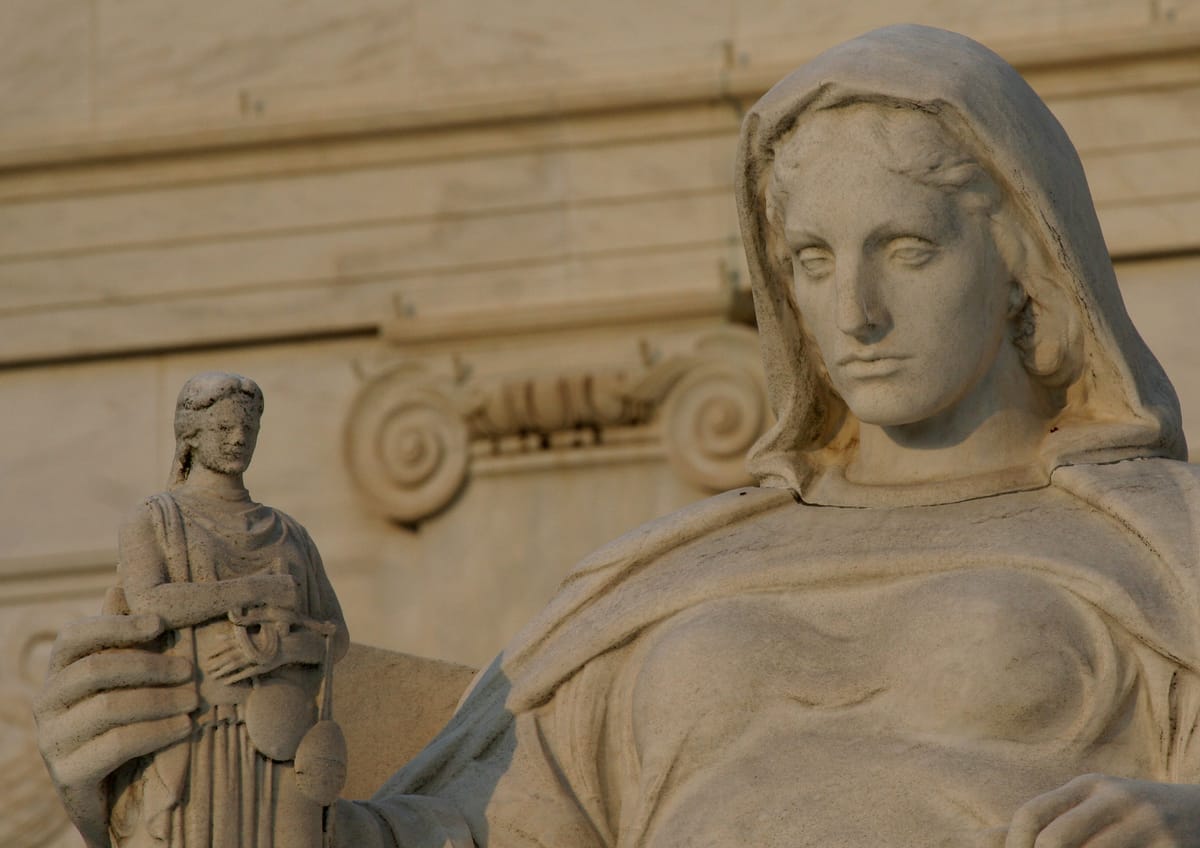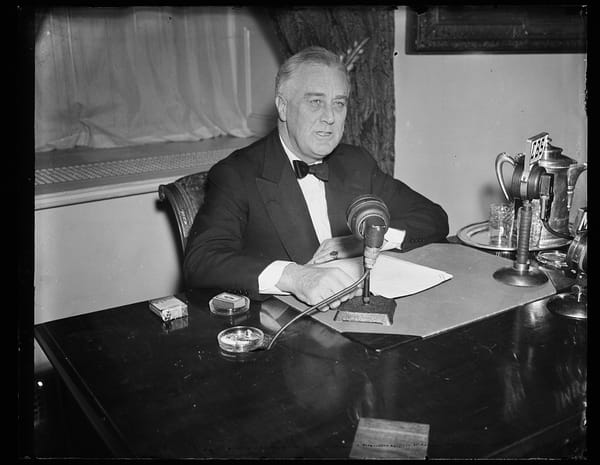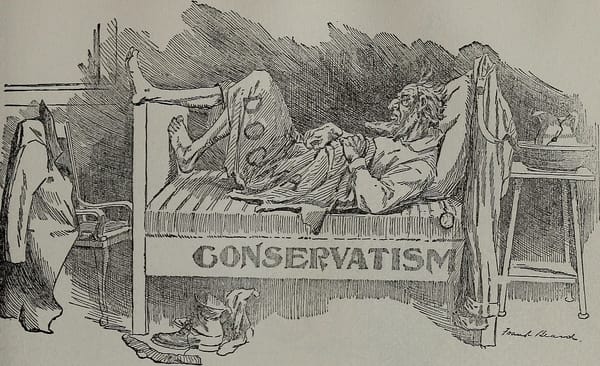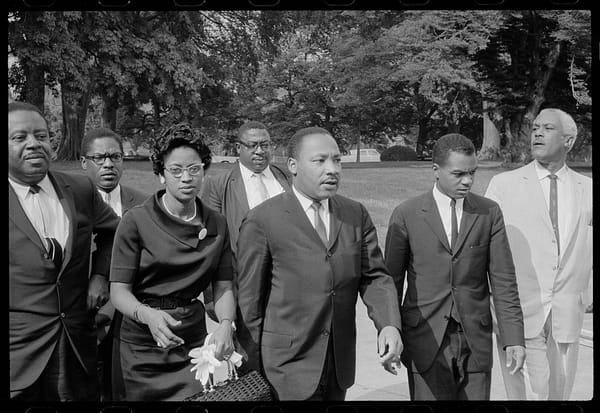Rawls in the Streets
Katrina Forrester's In the Shadow of Justice shows the radical potential—and political limitations—of John Rawls' philosophy.

Rawls the Good oftentimes seems like a nice way of saying Rawls the boring. For a figure said to have reinvigorated English-speaking political philosophy (the word was once political philosophy wholesale) it can be hard to figure out why upon first reading Theory of Justice. John Rawls' style is technical, hyper-academic, and dull. At 600 pages even dedicated Rawlsians often admit to tedium going through his opus. Rawls' approach to political philosophy can also feel cloistered—even defensive. Marx will declare all human history to be the story of class struggle. Burke was tempted to define the social contract as a gothic pact between the living, the dead, and the unborn. They offer epic visions that stir the soul and have the feel of great thought made flesh. By contrast Rawls will rarely make a claim that isn't qualified, and even then only after responding to what feels like every conceivable rebuttal that can be thrown his way. Last but most importantly, Rawls' style and approach can feel boring because the substance of his philosophy is more so. For a long time the overlapping consensus was that Rawls' Theory offered the most comprehensive defense of high liberalism's mid-century welfare state. The endgame of liberalism was getting everyone, fortunate or unfortunate, living in a reasonably affluent suburb in Scottsdale, Arizona. For those who turn to political philosophy to provide a sense of edification, or even the transcendent and heroic values a human life can embody, this was radically deflating.
So goes the conventional wisdom around Rawls critiques. The accumulated effect is to induce starry-eyed wonder that his work could ever provoke so much attention. And yet like so much conventional wisdom relayed to undergraduates, much of it is wrong. In her magisterial In the Shadow of Justice: Postwar Liberalism and the Remaking of Political Philosophy Harvard Professor Katrina Forrester offers a carefully researched primer on how Rawls' philosophy emerged. More importantly, she explains how and why Rawlsian political philosophy came to dominate much of the conversation for better or worse—so much so that in the English-speaking world even critics of Rawls and the enormous range of competing traditions that emerged in his wake still require a basic fluence in Rawlsese. The book aims to
make sense of the political work of Rawls's theory and what [his] acts of intellectual engagement were doing, both for him and those who read him, and what their consequences were. It also begins from the assumption that Rawls and his contemporaries inhabited a discursive ‘problem-space' that is at some distance from our own, even if our own emerged from it. (xxii)
While Forrester's book is largely a history, it does offer an appraisal of the strengths and weaknesses of the Rawlsian paradigm. She understands what many critics have failed to grasp—namely why such a superficially boring theory provoked electric attention. At the same time Forrester is keenly aware of the limitations of Rawlsianism to ask certain kinds of questions, and its dangerous remove from everyday politics.
Crafting a Theory of Justice
The most narrowly tailored chapters, and perhaps the least interesting except for serious Rawls scholars, concerns the construction to his theory of justice. Forrester writes in something of a social-historical vein, taking keen note of the conditions which inspired Rawls at any given time and shaped his intellectual development. She observes how after serving as a soldier in the Second World War, Rawls returned to academia with quasi-libertarian concerns. Deeply impacted by the fight against totalitarianism, Rawls began thinking of justice as "shoring up democratic thought against authoritarian threats. Philosophy and the Constitution were invoked against alternative ideologies and interests," (7). Interestingly, this was coupled with a very communal view of self-hood and society that "owed more to Wittgenstein, Hume, Tocqueville and Hegel than to Kant," (2). This methodologically collectivist grasp of society and selfhood is hard to reconcile with a kind of egoistic anti-statism, and under the influence of English leftists and Labour party socialists (amongst others) Rawls' thinking gradually moved leftward on economic issues.
By the time A Theory of Justice came out in 1971, Rawls had gradually adopted a more Kantian approach to the construction of political principles behind the veil of ignorance in the original position. This remained true even if Rawls' view of selfhood after the veil was lifted remained highly communal. More practically he'd come to embrace a new kind of egalitarianism which was radical in the extent to which it rejected desert as a basis for redistribution. Forrester stresses how Rawls had
"eliminated as basis for distribution those things he considered ‘arbitrary from a moral point of view.' He thought his theory demonstrated the injustice of commonly held ideas about distribution—most importantly, the idea that people get what they deserve. Natural talents, like economic wealth, were morally arbitrary. People could not be said to deserve a greater share because they were lucky in their lot, in the talents or wealth they started with. The idea of desert ought not to determine what inequalities of social fortune can be permitted." (115)
This seems exactly right to me, and I'd even emphasize the point further. There is a deep tradition going back to the Nicomachean Ethics which says a good society is one where each person gets what is his due. So powerful is the grip of this idea that human beings have vested themselves in enormously complex religious mythologies, which often hold that even if one doesn't receive one's due in this life, just rewards of Cocytian ice or Elysian fields await in the next. What has rarely been accepted is what an enormously utopian idea this is. Indeed many of the great religious traditions of the world showed surpassing wisdom in recognizing it was so utopian that only an omniscient, all powerful, and perfectly good deity could bring it about. Many conservatives have long counseled acknowledging Augustine's dictum about human flaws and the imperfectibility of society while failing to recognize it is far more realistic to conceive a society where all get what they need, or that might be governed by fair general rules, than one where each person gets remotely what they "deserve." On earth the rain will fall on the just and the unjust alike.
And yet the aspiration to build a society where each gets their due has never gone away and persists in perhaps the most audaciously utopian vision ever conceived by human beings: meritocracy. Where earlier societies stressed faith that only the visible hand of God could possibly give to each person their due in the next life, many defenders of meritocracy imagine it is possible for the invisible hand of the market to do the same in the profane world. It is hard to imagine a more fantastic idea. Even the communists only envisioned a society where everyone's needs would be met, without imagining it was possible to conceive a society where each gives according to his character and receives according to his true worth.
Rawls' radicalism
Much of the last third of In the Shadow of Justice is taken up with the reception of Rawls' work. Forrester notes how when Theory of Justice was published Rawls was "already a philosophical celebrity." His germinal papers had been well received, and the final theory long awaited. When the book came out even "Rawls's critics described it as noble," (104). Many of its basic categories and concerns were quickly adopted by liberal thinkers: the emphasis on the basic structure as the first subject of justice rather than the individual and her "natural" rights, the concern with principles of distributive justice which were indifferent to so-called desert, the long and tortured attempts to square support for civil disobedience and liberties with the need for stability over time, the strong emphasis on the right over the good and so on. And yet few people agreed with Rawls wholesale, and even sympathizers thought he'd gone wrong in how one should defend what quickly became christened liberal egalitarianism. The fiercest critics rejected the project wholesale, though even they were often compelled to adopt many of its concerns and offered alternatives.
Once this is understood, the furor over Rawls' liberalism becomes much easier to understand. I'll stick to issues of distributive justice to provide an example. For many conservatives, and even fellow liberal egalitarians like Dworkin, relegating moral desert and merit to irrelevance in terms of distributive justice was simply going too far. They labored hard to insist that some aspect of desert be saved from Rawls' argument that, when everything is taken together, people wind up where they do for reasons outside their control. Consequently, the right attitude to take towards poverty is not to applaud one's self for avoiding it; it is to say "there but for the grace of god go I" and commit to looking after the least well off.
As Forrester cannily observes, even some socialists were initially troubled by the sweep of Rawlsian indifference towards desert (222). The analytical Marxist G.A. Cohen initially took a more libertarian stance than Rawls, arguing in On the Currency of Egalitarian Justice that the "aim of egalitarianism was to eliminate involuntary disadvantage." Taken seriously this would require instantiating a very equal society. But Cohen and his ilk were initially disturbed by the implications of Rawlsianism for socialist theories of justice—namely those which stressed the working classes were being exploited by the wealthy by creating commodities of value which were then taken and sold for them by capitalists. On Rawls' vision, exploitation was largely an irrelevant moral category since there was no moral basis for claiming labourers "deserved" to keep the fruit of their labor, just as capitalists' appeals to their own hard work or one-sided "voluntary" contracts baked by state coercion likewise gave them no claim to profit either. All that mattered was distributing wealth to ensure the well-being of the least well-off. This struck "moralists" like Cohen as too focused on procedures, and not enough on outcomes.
A politics for liberal egalitarianism
Perhaps the most canny criticisms made of liberal egalitarianism came from "political theorists" operating in a very different tradition than the analytical one Rawls was brought up in. Forrester notes how
European post-Marxist and critical theories were largely ignored by analytical philosophers of public affairs, and political theorists who were heirs to the New Left's democratic critiques of liberalism embraced them and now canonized alternative theorists, like Hannah Arendt, Jurgen Habermas, and Sheldon Wolin. (241)
In his seminal Politics and Vision Wolin charged Rawls with offering a political philosophy without a real politics. He sarcastically noted Rawls'
...reluctance to undertake the political analyses necessary to demonstrate that justice is an urgent matter is the direct consequence of its failure to offer a coherent theory of power. Rawls's political world is all rules, law, and principles, never (in his words) ‘mere politics.' Especially striking is his failure to comprehend that an ‘advanced' economics is both an internal structure of power and influence and an external one affecting not only domestic but also foreign and military policies. Rather Rawlsian justice prefers a setting undisfigured by the power formations represented in domestic concentrations of economic power and wealth, corporate globalization, and Superpower.
Largely unconcerned with criticizing real power and ideology, Rawlsianism existed in the abstract realm of "ideal theory" where liberal egalitarians could construct so-called "realistic" utopias to their hearts' content without ever asking how to achieve them in the real world.
As Forrester notes this is somewhat unfair to Rawls given his own project was initially inspired by horror at the totalitarian regimes he'd bravely fought against. But she is by and large sympathetic to the claim that Rawlsianism has countenanced a "long neglect of ‘non-ideal realities, interests and ideologies…The assumption and aim of agreement and consensus look out of touch as the persistence of division has everywhere been revealed," (277). I'd go further still and argue that liberal egalitarianism has been too long cloistered against internalizing vital lessons about the plutocratic and ideological nature of capitalism. Economic elites have enormous resources available to defend their interests, and the ideologies thrown up by economic relations perennially distort our ability to think through alternatives. Liberal egalitarianism is unlikely to survive if it doesn't move out of the seminar room and into the streets. Or, to cheekily invoke MacIntyre in Ethics in the Conflict of Modernity, what Marx has had to teach liberals we have had to relearn again and again.
I think there are two primary dimensions to this. Firstly, liberal egalitarianism has long struggled to come to grips with the nature of economic power. In Justice as Fairness: A Restatement Rawls gestures in the right direction when he notes that inequalities in wealth inevitably translate into inequalities in political power which are incompatible with liberalism's commitment to equal citizenship. He is right, but this is thin stuff compared to what is required. Over the past decades empirical research has demonstrated how economic elites accumulate political power for themselves as part of an increasingly self-reinforcing cycle. Theoretically liberal egalitarians have a lot to learn from Marxists about how this isn't primarily the result of overt manipulation, but rather the "mute compulsion" of economic necessities which impose imperatives on us all.
Secondly, liberal egalitarians have rightly placed a great deal of faith in reason and rationality as a basis for politics. In many ways I think the left's retreat into irrationalist anti-Enlightenment sentiments was a serious error. But liberal egalitarians were wrong to assume that critical theory's critique of ideology was somehow antagonistic to reason. What critical theorists from Marx to Adorno and Wolin showed was how social relations throw up ideological illusions and irrational incentives whose causality reason must understand if we are to apprehend our reality properly. Cutting ourselves off from these theoretical resources, whose modern roots go back to liberals like Kant's critique of heteronomy, has been a serious error.
Nevertheless Forrester rightly points out that liberal egalitarianism is theoretically well-suited to addressing many of the problems of the time. Its abstract universalism can rightly open it up to accusations of being removed from the real world. But it also gives liberal egalitarianism a unifying power that could help persuade and motivate. Forrester speculates that liberal egalitarianism is "well placed to adjust its aims, drop some of its justificatory armor, and turn to critical or emancipatory programs of the kind that its concerns for universalisms and egalitarianism might easily support," (278). I think this is entirely right, and appropriate for a populist age. Where many now heed the siren's call of militant particularisms of the left to counterbalance the nationalist chauvinism of the right, I think progressives are more likely to succeed by appealing to a concrete universalism defended by reason. Specific struggles for class, racial, gender and sexual justice must continue. But these should be incorporated into a broader political project centered around the quintessentially liberal principle that all life is equally sacred and deserves to be experienced with dignity.
Our failure to adequately live by these ideals, let alone establish societies governed by them, is a demonstration of the ethical demands they make of us. These demands are far higher than those imposed by the right, which invariably lower our standards to looking after ourselves and potentially those who look and think like us—that is, where they don't lean on the utopian aspiration to play God and judge others without holding a mirror to themselves.
Liberty, equality, and solidarity for all remains the most powerful social vision yet articulated. That we have yet to build a society that lives up to it is a sign of how much is still to be done.
Featured image is Contemplation of Justice by James Earle Fraser, photo by David King




